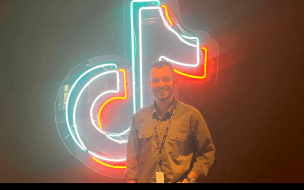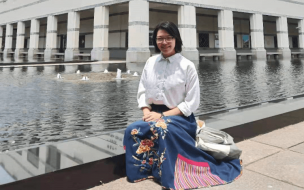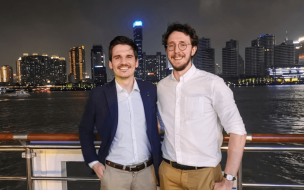Her thirst for self-development has led her to undertake several Moocs – massive open online courses – on topics such as competitive strategy and financial programing.
Daria spoke to BusinessBecause about the benefits of Moocs, and why she thinks they may one day overtake traditional universities.
Why do you want to begin an MBA program in two years’ time?
I am a lifelong learner, so I will try to get as many degrees as possible. I am even planning for a PhD.
One of my many hobbies is self-education through different channels such as Moocs and I feel like I am perfectly capable of continuing learning theory on my own. Instead, I would like to focus on the actual skills I can use.
An MBA is crucial these days because it is often the case that a bachelor’s graduate does not know what to do with their baggage of theory.
Which business schools are you planning to apply to?
I would say that UCLA Anderson is my first choice. I also find MIT Sloan incredibly attractive along with Harvard Business School, Stanford GSB, [and NYU:]Stern. In addition, I am considering UC Berkeley, Haas School of Business and UC San Diego Rady School of Management.
I did an arts, sports and media management course last summer and it felt like I have found the industry I dream of working in.
What is the most important factor for you when choosing a business school to apply to?
I do not go for names when it comes to choosing my future alma-mater. I base my decision on many criteria, like what industry does this school focus on and is it relevant to where I see myself working in the future?
Another thing that is of importance is the learning environment, and the social engagement of the school.
The final criterion is the structure of the programs – I look for fast-paced, highly practical, engaging and challenging programs.
What do you hope to do after the MBA?
I am most attracted to management and finance in the movie and TV industries, as well as the alternative energy [industry], and sustainable innovation. Although, with the current rate of technological progress, who knows what other industries will appear by the time I finish the MBA.
What I do know is that I do not see myself as a regular office employee. I want to act and make a difference, to move with the changing world.
How will you prepare for the GMAT or GRE?
I have never had a tutor in my life. I will continue with [the] GMAT in the same fashion. I already own several books to help me and will buy a couple more. I have already covered almost all the material from the ones I own, so lots and lots of practice is the only thing left to do before the exam, which I am planning to take in 2015.
What does your role entail as an ambassador for Unilever?
I am the eyes, ears and voice of Unilever at my university. I track the events of other companies, help Unilever with [the] organization of their own events, and connect with my fellow students to tell them about educational opportunities and internships.
You have completed online courses in different disciplines. What are their main benefits?
They give you a chance to choose what you learn and who you learn from. There are similar courses taught by different instructors and you can find the one that suits you best.
You can take a course on a subject you are interested in even if it is completely out of your specialization – broadening your horizons pays in the long run.
Another benefit is that you can learn at your own pace, when and where you [want]. I learn fast, and when things are too slow at lectures at university, I get frustrated.
I also have weird regime – I wake up at around 5am [and] my peak of activity is between 6am and 12pm, which conflicts with my university schedule.
How would you compare these courses to degree programs, and could they represent a viable alternative?
I find them as sufficient as a degree program would be, maybe even superior to the degree programs with one condition – the person taking it should be committed to learning, and be self-disciplined enough to avoid cheating. This is the main reason why we cannot make this substitution yet – we do not have any proof of the authenticity of one’s coursework.
Although if this issue is solved at some point in the future, I believe this kind of education will overtake traditional universities, thanks to its convenience and flexibility.
RECAPTHA :
58
88
61
db








